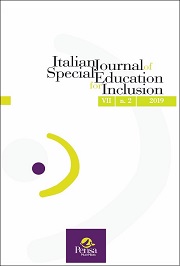Inclusion, disability and teacher education. A study for measuring attitudes and associated factors in a group of pre-service teachers. The OFAID scale
DOI:
https://doi.org/10.7346/sipes-02-2019-21Abstract
Positive attitudes on the part of teachers can strongly condition a positive approach to school inclusion, making the process more beneficial and enriching .Based on such belief, a great deal of research has sought to examine teachers’ attitudes towards the inclusion, while exploring factors that might influence their attitudes. The paper presents results of a study on attitudes towards disability and the inclusion of preservice teachers group of course on support disability and the degree course in Primary Education of the University of Salento (Lecce). The specific research questions for this study are as follows: What are pre-service teachers’ attitudes toward inclusion and disability? According to pre-service teachers group, what are the factors that influence teachers’ attitudes? According to the purpose of the study, two research tools were used: 1) SACIE-R scale (Forlin et al., 2011), a standardized tool to measure pre-service teachers’ perceptions (sentiments, attitudes and concerns) towards inclusion and disability; 2) OFAID scale, a tool developed by the research group that explores Opinions regarding the factors that influence the attitudes of teachers towards inclusion and disability. The results highlight the elements of greater fragility of a teacher training that should focus more on the relationship, on contact, on managing the fears. Implications and recommendations are discussed for inclusive policies practices and teacher education programs in training preservice professionals


